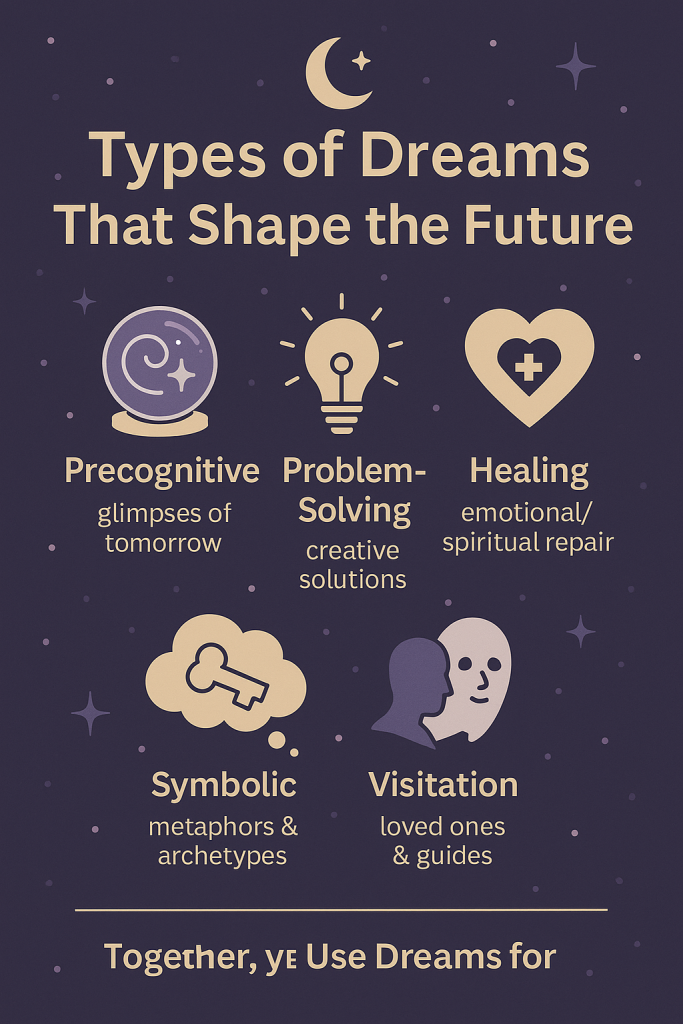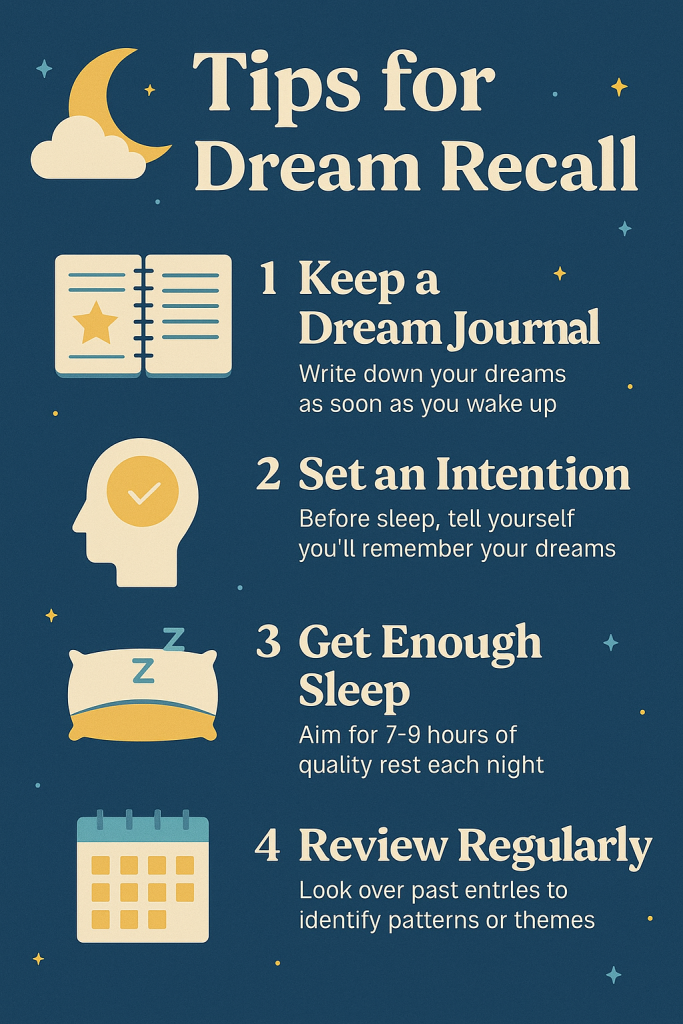We’ve all had that one dream—the kind that lingers after you wake up, leaving you unsettled or strangely inspired. Maybe it was a vivid reunion with a loved one who has passed, or maybe it was a bizarre scene that felt oddly like a message. You roll over and ask yourself: Was that just my imagination… or was it trying to tell me something?
Dreams aren’t random background noise from a restless brain. Across history and cultures, they’ve been viewed as sacred messages, windows into the subconscious, or even psychic previews of the future. Science now backs up some of what ancient mystics always believed: dreams help us process, prepare, and sometimes even predict.
Let’s explore how both psychology and psychic traditions show us that dreams aren’t just strange stories—they’re roadmaps for shaping our future.
What Science Says About Dreams
Neuroscientists describe dreams as the brain’s way of consolidating memory, processing emotions, and rehearsing challenges. Harvard Medical School highlights how dreaming strengthens emotional regulation and helps problem-solving by playing out scenarios in safe mental space (Harvard Health).
For example, if you’re nervous about a big presentation, you might dream about stumbling on stage. Far from being a nightmare, that rehearsal lowers stress and prepares you to perform better when it’s real.
The American Psychological Association (APA) notes that dreams also function as “emotion regulators”—giving us a mental laboratory to experiment with reactions before we face them in waking life (APA).
So while skeptics may dismiss dreams as brain static, science is catching up: they are practice grounds, healing labs, and creative workshops rolled into one.
Psychic and Spiritual Perspectives on Dreams

From a psychic lens, dreams are not just inner rehearsals—they’re portals. Many mediums say the dream state is when our logical defenses are quiet, making it easier for spirit guides, ancestors, or even glimpses of the future to slip through.
Visitation dreams: Deceased loved ones often appear vividly, bringing comfort or information that feels realer than waking life.
Precognitive dreams: Some people report dreams of future events later unfolding—like a friend’s phone call, a job opportunity, or even global events.
Symbolic dreams: Spirit messages may come coded in archetypes—locked doors for fear, floods for emotions, wings for freedom.
One woman recalled dreaming of her grandmother giving her a necklace. Days later, she stumbled into an antique shop and found that very necklace on display. The dream wasn’t random—it prepared her for a moment of spiritual connection.
Psychics often frame dreams as a “meeting point” between the physical and spiritual realms, where intuitive truths surface more clearly than in waking life.
Types of Dreams That Can Shape the Future
Not every dream is predictive—sometimes you’re just processing the latest Netflix binge. But certain types of dreams stand out, and these are the ones that can guide your path forward.
Precognitive Dreams
These are the ones people talk about at dinner parties—the dream that comes true days or weeks later. A woman dreams of her best friend calling from a new job, and the next week it happens. History is full of examples, from Abraham Lincoln dreaming of his own funeral to ordinary people dreaming of events before they unfold.
Problem-Solving Dreams
Your brain is a master troubleshooter, and dreams often work as overnight brainstorming sessions. Many inventors, writers, and artists credit dreams for breakthroughs. Paul McCartney famously “woke up” with the melody for Yesterday in his head after hearing it in a dream. Modern dream research supports this—creative problem-solving is a core function of dreaming (APA).
Healing Dreams
Sometimes dreams act like emotional medicine. A man struggling with grief might dream of his late partner embracing him, waking with renewed calm. From a psychic perspective, healing dreams may even reflect energy work happening while you sleep.
Symbolic Dreams
Not every dream is literal—many come wrapped in metaphor. Dreaming of floods might symbolize being overwhelmed emotionally; dreaming of broken shoes may reflect feeling unprepared for a journey. Jungian psychology refers to these as archetypal symbols, connecting personal meaning with collective patterns.
Visitation Dreams
Perhaps the most powerful, these dreams feel palpably real. You see, hear, and even smell a deceased loved one. Unlike normal dreams, visitation dreams bring peace instead of confusion. Many mediums say this is one of the easiest ways spirits reach us, since our defenses are down.
Example in Practice
A client once described recurring dreams of locked doors. In a psychic reading, it became clear the dream symbolized her fear of leaving a toxic relationship. Once she acted on that awareness, her dreams shifted to wide open landscapes. The transformation of the dream mirrored her real-life freedom.
Dreams may arrive dressed as symbols, emotions, or uncanny snapshots of tomorrow—but all have the potential to shape your decisions in waking life.
Famous Historical and Cultural Examples
Dreams influencing the future isn’t just a modern curiosity—it’s woven throughout history and across cultures.
Abraham Lincoln’s Prophetic Dream
Days before his assassination, President Lincoln told close friends of a dream where he wandered the White House and came upon a casket guarded by soldiers. When he asked who had died, a voice replied, “The president.” That chilling account was recorded by his aides, and it remains one of history’s most famous precognitive dreams.
Paul McCartney and the Song “Yesterday”
In the 1960s, Paul McCartney literally woke up with a tune in his head from a dream. Unsure if he had plagiarized it, he played it for friends to confirm. It turned out to be completely original. That melody became one of the Beatles’ most iconic hits, all thanks to the dream state.
Indigenous Dream Traditions
The Iroquois people believed dreams were direct messages from the soul, carrying instructions for both individuals and communities. Ignoring a dream was seen as ignoring spiritual guidance. Many Indigenous cultures still hold ceremonies where dreams are shared and interpreted for collective wisdom.
Carl Jung’s Archetypes
Swiss psychologist Carl Jung emphasized that dreams carry symbols from the “collective unconscious”—a shared psychic reservoir of human experience. He argued that recurring dream images (like floods, journeys, or flying) are universal symbols meant to guide human growth.
Modern Examples
Even today, dream-inspired breakthroughs shape culture and science. Dmitri Mendeleev credited a dream with helping him map the periodic table of elements. Fashion designers, scientists, and entrepreneurs often say their best ideas “came in a dream.”
The Sleep Foundation notes that while science can’t fully explain why, many dreamers wake with actionable insights that change their lives (Sleep Foundation).
Dreams, whether personal or cultural, have always been roadmaps—sometimes warning of danger, other times opening new creative frontiers.
Modern Applications of Dream Guidance
Dreams aren’t just historical curiosities—they continue to shape careers, relationships, and even health in modern life. When we treat dreams as guidance rather than random noise, they become a practical tool for growth.
Entrepreneurs and Innovators
Some business leaders actively keep dream journals to catch flashes of inspiration. For instance, an entrepreneur once dreamed of a product design that solved a problem his team had been struggling with for months. Acting on that dream sketch, he pitched the idea and it later became his company’s flagship product. Dreams often bypass logical roadblocks and deliver solutions straight from the subconscious.
Artists and Creatives
Musicians, painters, and writers frequently credit dreams for their work. Salvador Dalí even developed “slumber with a key,” a method where he’d doze off holding a spoon and wake when it dropped, capturing the surreal images between waking and sleeping. Many modern creatives use similar techniques to turn dream fragments into art.
Therapists and Healers
Dream therapy is increasingly being used to help people heal trauma. Verywell Mind notes that therapists who practice dream analysis can uncover themes of fear, control, or loss that might not surface in talk therapy alone (Verywell Mind). For clients, dreams provide a safe space where the unconscious speaks first, often leading to breakthroughs.
Athletes and Performers
Visualization is a powerful tool, and some athletes find it occurs naturally in dreams. A gymnast, for example, might dream of landing a routine successfully, and that rehearsal imprints in the body’s memory, increasing confidence in waking life.
Everyday Examples
A student dreams of repeatedly missing buses, realizing it mirrors her anxiety about missed opportunities. With that awareness, she starts planning ahead more carefully.
An artist wakes with vivid colors and shapes from a dream and uses them in her next painting series, which sells out quickly.
A grieving son dreams of his father pointing to a desk drawer. The next day, he finds old letters tucked away—letters that bring peace and closure.
Dreams are not just psychological footnotes—they are creative partners, business consultants, and emotional healers when we learn how to listen.
How Psychic Readings Complement Dream Work
Dreams often feel mysterious: vivid in the moment, but slippery upon waking. That’s where psychic readings become powerful companions to dreamwork. They help us interpret, validate, and act on the insights our subconscious (and spirit guides) may already be sending.
Translating Symbolic Language
Psychics are trained to work with archetypes and symbolism, much like Jungian psychologists but with an intuitive twist. A recurring dream about drowning, for example, might be unpacked as unresolved grief or emotional overwhelm. A psychic can help you connect that dream theme to real-life situations where emotions are flooding your boundaries.
Validating Visitation Dreams
One of the most common questions clients bring to a psychic is: “Was my dream of my loved one real?” Mediums often confirm these dreams as true spirit visits, noting details the dreamer couldn’t have imagined alone. For many, this validation transforms grief into comfort, turning a bittersweet dream into proof of ongoing connection.
Clarifying Timing and Next Steps
Astrologers and tarot readers can tie dream themes to cosmic timing. Dreaming of endless doors, for instance, may point to Saturn lessons about responsibility or Jupiter pushing for expansion. A tarot spread might highlight which “door” is ready to be opened first.
Energy Healing Through Dreams
Energy healers often explain that dreams are natural “maintenance sessions” for the aura and chakras. Psychic input can illuminate which chakra is being addressed. For example, dreams about speaking or losing your voice might connect to the throat chakra—suggesting a need for clearer communication.
Example in Practice
A woman had recurring dreams of locked doors. In a psychic reading, it was revealed that these doors symbolized her subconscious resistance to leaving a toxic job. Once she took action, the dream changed: instead of locked doors, she dreamed of open fields. The psychic validation gave her confidence to act, and the dream itself evolved to mirror her liberation.
By pairing dreams with psychic readings, you gain both language and context. Dreams supply the raw images, while psychics provide the map that shows where those images want to lead you.
Practical Steps for Using Dreams for the Future

Dreams can feel fleeting—one moment they’re vivid, the next they vanish with the morning coffee. But with a few practical and psychic-friendly habits, you can turn your dream life into a roadmap for the future.
1. Keep a Dream Journal
Write down your dreams the moment you wake. Even fragments—colors, emotions, objects—are valuable. Over time, you’ll notice repeating themes that point to deeper guidance. Keep your journal by the bed so you don’t lose details.
2. Set a Pre-Sleep Intention
Before drifting off, ask: “Show me clarity about my career” or “Help me release this fear.” Think of it as programming your inner GPS. Many people report clearer, more directed dreams when they fall asleep with a question in mind.
3. Look for Patterns
One dream about water may not mean much, but ten dreams about floods in a year suggest your subconscious (or spirit team) is waving a flag. Patterns reveal what’s truly demanding your attention.
4. Pair Dreams with Psychic Guidance
Bring your dream journal to a psychic reading. Together, you can decode the layers: is the recurring shadow figure fear, an ancestor, or an archetype calling you to face something hidden? Pairing your notes with psychic input often sparks powerful “aha” moments.
5. Create a Ritual to Honor Dreams
Lighting a candle, placing amethyst or moonstone under your pillow, or doing a short meditation before sleep signals that you take your dreams seriously. Rituals amplify intention—and intention often deepens results.
6. Act on Insights
Dreams lose power if they stay abstract. If your dream suggests forgiveness, reach out. If it hints at creativity, start that project. Acting—even in small steps—builds trust with your subconscious and spirit guides, inviting more helpful dreams.
Example in Practice
One entrepreneur dreamed of standing at a crossroads every week for months. With a psychic’s help, he realized it symbolized his hesitation about expanding his business. Once he committed to opening a second location, the crossroads dream stopped—replaced by dreams of highways and forward motion.
Practical steps create the bridge: dreams give the inspiration, and your waking actions bring them to life.
Balancing Skepticism and Openness
Not everyone is quick to believe that dreams predict the future. Scientists often see them as neural “noise,” while psychics view them as sacred messages. The truth may lie in a dance between the two perspectives.
Science as a Grounding Lens
The Sleep Foundation notes that dreams play a role in processing emotions, consolidating memories, and making sense of our daily stressors (Sleep Foundation). From this lens, dreams are a cognitive tool—practical, measurable, and essential for mental health.
Psychic Insight as an Expanding Lens
At the same time, countless people report dreams that defy simple explanation—hearing a future event, receiving guidance from deceased loved ones, or waking with solutions to problems that seemed impossible the day before. Spiritual traditions across the globe—from Indigenous tribes to Eastern philosophies—validate the idea that dreams connect us with a higher dimension of truth.
The Middle Path
Dreams don’t have to be either science or spirit—they can be both. Science can explain how the brain weaves memories and emotions into narratives, while psychic wisdom can highlight why those narratives carry deeper meaning. One shows the “how,” the other reveals the “why.”
Example in Practice
A young woman plagued by dreams of missing buses brought her concerns to both a therapist and a psychic. The therapist helped her see the anxiety pattern in daily life (she feared missing deadlines). The psychic reframed it spiritually: the dreams were nudges to claim opportunities instead of doubting herself. Together, those insights empowered her to apply for—and land—a new job.
The balance is not about choosing sides. It’s about respecting science as the anchor while letting psychic guidance expand the horizon.
Conclusion: Dreams as Future Roadmaps
Dreams are not just quirky stories our minds tell at night—they are messages, rehearsals, and sometimes spiritual postcards from the soul. Science shows us they regulate emotions, process memories, and unlock creativity. Psychic traditions remind us they can also reveal spiritual guidance, ancestral voices, and glimpses of what lies ahead.
When you treat dreams as more than background noise, they become a map. A dream journal, nightly intentions, and even the wisdom of a trusted psychic can help you decode and act on what your dream life is trying to show you.
Think of dreams as a partnership: your subconscious, your spirit, and the universe co-authoring notes on your life’s journey. When you read them carefully, they become tools for growth, healing, and shaping a brighter future.
Frequently Asked Questions
What does it mean to use dreams for the future?
Can dreams really predict future events?
What are precognitive dreams?
How do I know if a dream is symbolic or literal?
Are visitation dreams from loved ones real?
How does science explain dreaming?
Can dreams improve decision-making?
What role do emotions play in dreams?
How can I start dream journaling?
Do certain foods or habits affect dreams?
What is lucid dreaming and can it shape the future?
Can psychic readings validate dream messages?
How do cultural traditions view dreams?
Why do I keep having the same dream?
What are healing dreams?
Can I program my dreams before sleeping?
What is the difference between psychic and psychological dream interpretation?
How do I interpret dreams about water, flying, or falling?
What did Carl Jung say about dreams?
Are nightmares ever messages for the future?
How do I use dreams to solve problems?
Do dreams connect to my chakras or energy body?
Can I dream about my spirit guides?
Why do dreams feel more real than waking life sometimes?
Can dreams help me with grief or loss?
Are all recurring dreams important?
Can meditation enhance dream recall?
How do I bring dream insights into waking life?
What’s the best way to combine dreamwork with psychic readings?
How do I know if a dream is just stress or true guidance?





This article provides an intriguing perspective on the phenomenon of precognitive dreams. It’s fascinating to consider how our subconscious mind might be processing information to the extent that it can foresee future events. The examples cited, such as the Titanic disaster and President Lincoln’s assassination, indeed add a historical gravitas to the discussion. However, it’s important to approach the interpretation of dreams with a critical mindset, as our cognitive biases and the power of coincidence can sometimes lead us to see patterns that aren’t truly predictive in nature. Journaling dreams, as suggested, is a practical approach to discerning whether specific types of dreams align with future occurrences, helping in understanding the nuances of our dreams and their potential implications.
This article provides a fascinating insight into the nature of precognitive dreams. The examples mentioned, such as President Lincoln’s dream about his assassination, lend significant credibility to the phenomenon. Journaling dreams, as suggested, is a practical approach for anyone curious about exploring this intriguing aspect of human consciousness. Understanding these dreams could potentially help us make informed decisions and prepare for future events. An excellent read!
Documenting dreams in a journal is a practical method to analyze potential premonitions. However, it’s essential to differentiate between mere coincidences and genuine foresight.
It also depends on one’s belief system. Some cultures and individuals place a great deal of significance on dreams, while others view them as random neural activity.
Agreed. Journaling can help identify patterns, but the interpretation of dreams is highly subjective and can often be influenced by hindsight bias.
The concept of precognitive dreams is fascinating. It reminds me of Jung’s theory of the collective unconscious where archetypal symbols and memories reside.
Our subconscious mind is powerful and complex. It’s possible that what we perceive as precognitive dreams are our brain’s way of processing information and predicting outcomes based on our experiences.
Indeed, cognitive psychology suggests that our brain continuously makes predictions about the future based on past experiences, which could explain some instances of seemingly precognitive dreams.
While individual reports of precognitive dreams are intriguing, I’m curious about the scientific validity behind such claims. Are there any empirical studies that support the existence of premonition dreams?
The historical instances provided, such as Lincoln’s assassination dream and the Titanic, are compelling. However, it’s difficult to verify their authenticity and whether they were documented prior to the events they predicted.